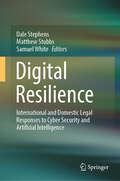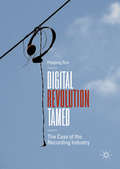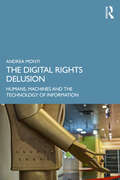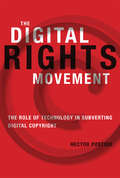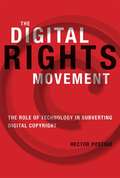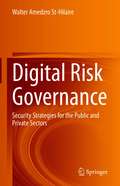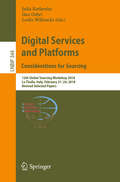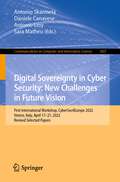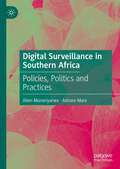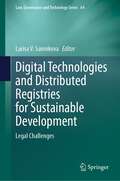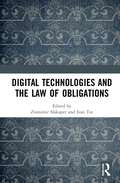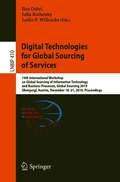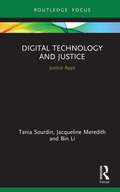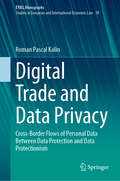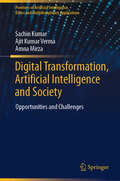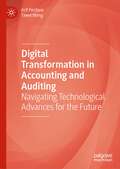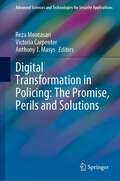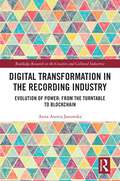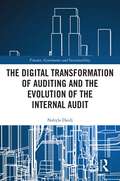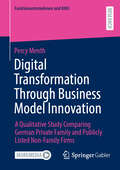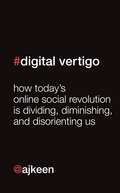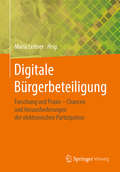- Table View
- List View
The Digital Public Domain: Foundations for an Open Culture
by Melanie Dulong de Rosnay and Juan Carlos De MartinDigital technology has made culture more accessible than ever before. Texts, audio, pictures and video can easily be produced, disseminated, used and remixed using devices that are increasingly user-friendly and affordable. However, along with this technological democratization comes a paradoxical flipside: the norms regulating culture's use—copyright and related rights—have become increasingly restrictive. <p><p> This book brings together essays by academics, librarians, entrepreneurs, activists and policy makers, who were all part of the EU-funded Communia project. Together the authors argue that the Public Domain—that is, the informational works owned by all of us, be that literature, music, the output of scientific research, educational material or public sector information—is fundamental to a healthy society. <p> The essays range from more theoretical papers on the history of copyright and the Public Domain, to practical examples and case studies of recent projects that have engaged with the principles of Open Access and Creative Commons licensing. The book is essential reading for anyone interested in the current debate about copyright and the Internet. It opens up discussion and offers practical solutions to the difficult question of the regulation of culture at the digital age.
Digital Resilience: International and Domestic Legal Responses to Cyber Security and Artificial Intelligence
by Dale Stephens Matthew Stubbs Samuel WhiteThis book arises from a cybersecurity conference at the University of Adelaide attended by a group of government and academic experts. It presents the possible responses Australia can take to deter and respond to cybersecurity threats. It also examines the legal responsibility for cyber security and artificial intelligence, asking who (if anyone) bears responsibility for the myriad legal issues that arise. This book presents an authoritative legal framework for understanding the liability and responsibility of actors involved in cyberspace and the use of artificial intelligence. Providing an overarching summary of cybersecurity and artificial intelligence threats, followed by detailed analysis of potential authorizations and limitations regulating policy and governance responses, this book canvases a wide spectrum of civil and criminal frameworks. It is comprehensive enough to be useful for a wide cross-section of the Australian society in a range of sectors: individual users, small businesses, tertiary institutions, large corporations, and government. It is also beneficial to military personnel in outlining the legal frameworks available in times of armed conflict.
Digital Revolution Tamed: The Case of the Recording Industry
by Hyojung SunThis book explores why widespread predictions of the radical transformation in the recording industry did not materialise. Although the growing revenue generated from streaming signals the recovery of the digital music business, it is important to ask to what extent is the current development a response to digital innovation. Hyojung Sun finds the answer in the detailed innovation process that has taken place since Napster. She reassesses the way digital music technologies were encultured in complex music valorisation processes and demonstrates how the industry has become reintermediated rather than disintermediated. This book offers a new understanding of digital disruption in the recording industry. It captures the complexity of the innovation processes that brought about technological development, which arose as a result of interaction across the circuit of the recording business – production, distribution, valorisation, and consumption. By offering a more sophisticated account than the prevailing dichotomy, the book exposes deterministic myths surrounding the radical transformation of the industry.
The Digital Rights Delusion: Humans, Machines and the Technology of Information
by Andrea MontiThis book examines the ever-increasing impact of technology on our lives and explores a range of legal and constitutional questions that this raises. It considers the extent to which concepts such as 'cyberspace' and 'digital rights' advance or undermine our understanding of this development and proposes a number of novel approaches to the effective protection of our rights in this rapidly evolving environment. Finally, it shows how the abuse of the adjective digital has demoted legal rights into subjective and individual claims. The work will be of particular interest to scholars of privacy, artificial intelligence and free speech, as well as policymakers and the general reader.
The Digital Rights Movement: The Role of Technology in Subverting Digital Copyright (The Information Society Series)
by Hector PostigoThe evolution of activism against the expansion of copyright in the digital domain, with case studies of resistance including eBook and iTunes hacks.The movement against restrictive digital copyright protection arose largely in response to the excesses of the Digital Millennium Copyright Act (DMCA) of 1998. In The Digital Rights Movement, Hector Postigo shows that what began as an assertion of consumer rights to digital content has become something broader: a movement concerned not just with consumers and gadgets but with cultural ownership. Increasingly stringent laws and technological measures are more than incoveniences; they lock up access to our “cultural commons.”Postigo describes the legislative history of the DMCA and how policy “blind spots” produced a law at odds with existing and emerging consumer practices. Yet the DMCA established a political and legal rationale brought to bear on digital media, the Internet, and other new technologies. Drawing on social movement theory and science and technology studies, Postigo presents case studies of resistance to increased control over digital media, describing a host of tactics that range from hacking to lobbying.Postigo discusses the movement's new, user-centered conception of “fair use” that seeks to legitimize noncommercial personal and creative uses such as copying legitimately purchased content and remixing music and video tracks. He introduces the concept of technological resistance—when hackers and users design and deploy technologies that allows access to digital content despite technological protection mechanisms—as the flip side to the technological enforcement represented by digital copy protection and a crucial tactic for the movement.
The Digital Rights Movement
by Hector PostigoThe movement against restrictive digital copyright protection arose largely in response to the excesses of the Digital Millennium Copyright Act (DMCA) of 1998. In The Digital Rights Movement, Hector Postigo shows that what began as an assertion of consumer rights to digital content has become something broader: a movement concerned not just with consumers and gadgets but with cultural ownership. Increasingly stringent laws and technological measures are more than incoveniences; they lock up access to our "cultural commons. " Postigo describes the legislative history of the DMCA and how policy "blind spots" produced a law at odds with existing and emerging consumer practices. Yet the DMCA established a political and legal rationale brought to bear on digital media, the Internet, and other new technologies. Drawing on social movement theory and science and technology studies, Postigo presents case studies of resistance to increased control over digital media, describing a host of tactics that range from hacking to lobbying. Postigo discusses the movement's new, user-centered conception of "fair use" that seeks to legitimize noncommercial personal and creative uses such as copying legitimately purchased content and remixing music and video tracks. He introduces the concept of technological resistance--when hackers and users design and deploy technologies that allows access to digital content despite technological protection mechanisms--as the flip side to the technological enforcement represented by digital copy protection and a crucial tactic for the movement.
Digital Risk Governance: Security Strategies for the Public and Private Sectors
by Walter Amedzro St-HilaireThis book discusses digital risk governance in a global context and provides practical solutions for sound digital policy. From cyber-attacks to the mechanisms of digital technical management on a global scale, this book identifies the fundamental areas of digital vulnerability for both states and businesses and outlines the means of securing them. Written with the digital security needs of the public and private sectors in mind, chapters provide approachable guidance on navigating national digital strategies for public and corporate cyber-risks, identifying mechanisms for embedding digital security over time, protecting both personal and strategic economic data, adapting regulations to digital challenges, and leveraging innovation and multilateralism for digital security. Providing a comprehensive view of digital risk mechanisms for multiple stakeholders, this volume will be useful for professionals and practitioners in technology governance, digital management, IS/risk management, digital security, and internet policy.
Digital Services and Platforms. Considerations for Sourcing: 12th Global Sourcing Workshop 2018, La Thuile, Italy, February 21–24, 2018, Revised Selected Papers (Lecture Notes in Business Information Processing #344)
by Julia Kotlarsky Ilan Oshri Leslie WillcocksThis book constitutes revised selected papers from the 12th international Global Sourcing Workshop 2018, held in La Thuile, Italy, in February 2018. The 9 contributions included were carefully reviewed and selected from 40 submissions. The book offers a review of the key topics in sourcing of services, populated with practical frameworks that serve as a tool kit to students and managers. The range of topics covered in this book is wide and diverse, offering micro and macro perspectives on successful sourcing of services. Case studies from various organizations, industries and countries are used extensively throughout the book, giving it a unique position within the current literature offering.
Digital Sovereignty in Cyber Security: First International Workshop, CyberSec4Europe 2022, Venice, Italy, April 17–21, 2022, Revised Selected Papers (Communications in Computer and Information Science #1807)
by Antonio Skarmeta Daniele Canavese Antonio Lioy Sara MatheuThis book constitutes papers presented during the workshop session titled “CyberSec4Europe - Research to Innovation: Common Research Framework on Security and Privacy” during the Privacy Symposium hosted by Università Ca’ Foscari in Venice, Italy, in April 2022. The 11 peer-reviewed selected papers present findings, conclusions, research, and recommendations in various security-related areas, from highly technical ones (e.g., software and network security) to law and human-centric ones (e.g., governance and cybersecurity awareness).
Digital Surveillance in Southern Africa: Policies, Politics and Practices
by Allen Munoriyarwa Admire MareThis book critically examines the manifest and latent practices of surveillance in the southern African region, using case studies from South Africa, Zimbabwe, Zambia, Namibia, Botswana and Mozambique. The book demonstrates the growing role of super-powers in the construction and normalization of the surveillance state. It traces the digitization of surveillance practices to the rapid adoption of smart CCTV, facial recognition technologies and EMSI catchers. Through predictive policing mechanisms, state security agencies have appropriated digital media technologies for sentiment analysis, constant monitoring of digital footprints of security targets, and even deploying cyber-troops on popular social media platforms. The authors argue that surveillance practices have thus been digitized with deleterious impact on the right to privacy, peaceful assembly and freedom of expression in the region. Furthermore, they argue that specific laws and regulations governing surveillance practices in the region are lagging behind. Finally, the book demonstrates how digital surveillance have significantly infiltrated the political, economic and social fabric of Southern Africa. This book provides much needed systematic, cutting-edge research into the trends, practices, policies and geo-political interests at the center of surveillance practices in the region, providing a crucial link between human rights, such as freedom of privacy and expression, and political authoritarianism.
Digital Technologies and Distributed Registries for Sustainable Development: Legal Challenges (Law, Governance and Technology Series #64)
by Larisa V. SannikovaDigital technologies are playing a growing role in achieving the UN’s Sustainable Development Goals (SDGs). They are both a tool both for achieving developmental outcomes and a driver of change. However, the use of digital technologies also entails certain legal challenges. The purpose of this book is to highlight these challenges and suggest solutions. Written by leading researchers from six countries, who analyse legislative solutions from around the world, it includes chapters on the benefits of asset tokenisation, the role of artificial intelligence in achieving sustainable development, legal issues in the green digital transformation, and human rights in a digital world. Through a mixture of fundamental analysis and real-world examples, readers will learn how emerging digital technologies can help achieve various SDGs and what legal challenges arise from their application. This important resource will be of interest to academics, government and legal officials whose work involves the legal regulation of the introduction and use of new digital technologies, as well as sustainable development challenges. Legal experts engaged in the design of new legal infrastructures during the current phase of digital, climatic and social transformation in private, public and social organizations will also find it useful.
Digital Technologies and the Law of Obligations
by Zvonimir Slakoper Ivan TotDigital Technologies and the Law of Obligations critically examines the emergence of new digital technologies and the challenges they pose to the traditional law of obligations, and discusses the extent to which existing contract and tort law rules and doctrines are equipped to meet these new challenges. This book covers various contract and tort law issues raised by emerging technologies – including distributed ledger technology, blockchain-based smart contracts, and artificial intelligence – as well as by the evolution of the internet into a participative web fuelled by user-generated content, and by the rise of the modern-day collaborative economy facilitated by digital technologies. Chapters address these topics from the perspective of both the common law and the civil law tradition. While mostly focused on the current state of affairs and recent debates and initiatives within the European Union regulatory framework, contributors also discuss the central themes from the perspective of the national law of obligations, examining the adaptability of existing legal doctrines to contemporary challenges, addressing the occasional legislative attempts to deal with the private law aspects of these challenges, and pointing to issues where legislative interventions would be most welcomed. Case studies are drawn from the United States, Singapore, and other parts of the common law world. Digital Technologies and the Law of Obligations will be of interest to legal scholars and researchers in the fields of contract law, tort law, and digital law, as well as to legal practitioners and members of law reform bodies.
Digital Technologies for Global Sourcing of Services: 14th International Workshop on Global Sourcing of Information Technology and Business Processes, Global Sourcing 2019, Obergurgl, Austria, December 18–21, 2019, Proceedings (Lecture Notes in Business Information Processing #410)
by Ilan Oshri Julia Kotlarsky Leslie P. WillcocksThis book constitutes revised selected papers from the 14th International Global Sourcing Workshop 2019, held in Obergurgl, Austria, in December 2019. The 10 contributions included were carefully reviewed and selected from a total of 36 submissions.The book offers a review of the key topics in sourcing of services, populated with practical frameworks that serve as a tool kit to students and managers. The range of topics covered in this book is wide and diverse, offering various perspectives on the employment of digital technologies in the context of sourcing services. More specifically the book examines sourcing decisions and management practices around digital platforms, robotic process automation and blockchain, giving specific attention to digital aspects of innovation in sourcing.
Digital Technology and Justice: Justice Apps
by Tania Sourdin Jacqueline Meredith Bin LiJustice apps – mobile and web-based programmes that can assist individuals with legal tasks – are being produced, improved, and accessed at an unprecedented rate. These technologies have the potential to reshape the justice system, improve access to justice, and demystify legal institutions. Using artificial intelligence techniques, apps can even facilitate the resolution of common legal disputes. However, these opportunities must be assessed in light of the many challenges associated with app use in the justice sector. These include the digital divide and other accessibility issues; the ethical challenges raised by the dehumanisation of legal processes; and various privacy, security, and confidentiality risks. Surveying the landscape of this emergent industry, this book explores the objectives, opportunities, and challenges presented by apps across all areas of the justice sector. Detailed consideration is also given to the use of justice apps in specific legal contexts, including the family law and criminal law sectors. The first book to engage with justice apps, this book will appeal to a wide range of legal scholars, students, practitioners, and policy-makers.
Digital Trade and Data Privacy: Cross-border Flows of Personal Data Between Data Protection and Data Protectionism (European Yearbook of International Economic Law #38)
by Roman Pascal KalinThis monograph provides a comprehensive examination of the intricate legal challenges arising at the intersection of digital trade and data privacy. It argues in favour of an integrated approach to understanding the dynamic interaction between digital trade and data privacy, with the aim of building a bridge between these two fields of law. Cross-border data flows are paramount for the operational efficiency and productivity of companies across diverse industries. The ongoing economic transformation, characterized by the perception of data as both a commodity and currency, exacerbates the tension between the push for economic liberalization of cross-border transfers of personal data under a trade rationale and the limitations imposed on such transfers for non-economic reasons. Given that the regulation of cross-border personal data transfers is profoundly influenced by both international trade law and national data privacy laws, a complex relationship has developed between the normative values that underpin these legal frameworks. This publication centers on the resulting interdependence of digital trade and data privacy in a global digital economy. It provides a contribution to the debate on a (re)contextualisation of trade law against the background of the advent of digital trade.
Digital Transformation, Artificial Intelligence and Society: Opportunities and Challenges (Frontiers of Artificial Intelligence, Ethics and Multidisciplinary Applications)
by Ajit Kumar Verma Sachin Kumar Amna MirzaThis book examines the fundamental concepts and principles of digital transformation and AI, including their historical development, and underlying technologies, and analyzes the opportunities arising from digital transformation and AI in different sectors, such as healthcare, finance, education, transportation, and governance. It provides a comprehensive overview of digital transformation and AI technologies and their current state of implementation. It also explores the potential challenges and risks associated with digital transformation and AI, including ethical considerations, job displacement, privacy concerns, biases, impact on inequality, social interactions, and the overall well-being of individuals and communities. Additionally, the books provides and discusses policy and regulatory frameworks that can effectively address the opportunities and challenges posed by digital transformation and AI leading to responsible AI. It also delves into impact of automation on the job market and workforce. The book concludes by proposing potential strategies for navigating opportunities and challenges of digital transformation and AI integration. It emphasizes the need for interdisciplinary collaboration among stakeholders, including policymakers, industry leaders, academia, and civil society, to develop a comprehensive approach towards harnessing the full potential of digital transformation and AI and associated technologies. The book employs a multidisciplinary approach, drawing from various fields such as computer science, sociology, philosophy, political science, economics, law and governance. It combines theoretical analysis, empirical case studies, and expert perspectives to provide a holistic view of the subject matter. This book caters to a diverse audience, including students, researchers, academics, policymakers, industry professionals, and technology enthusiasts. It provides a valuable resource for those seeking a comprehensive understanding ofthe opportunities and challenges arising from the integration of digital transformation and AI in society.
Digital Transformation in Accounting and Auditing: Navigating Technological Advances for the Future
by Arif Perdana Tawei WangThis book elucidates the digital transformation of accounting by examining the countless challenges academic institutions encounter in the wake of technological progress. This underscores the importance of accountants in enhancing their skill set to align with today’s evolving digital landscape. The text evaluates cutting-edge technologies, such as artificial intelligence, data analytics, and blockchain, exploring their impact on accounting decision-making processes. Through a comprehensive analysis of the intersection between these technologies and diverse industrial sectors, this book illuminates the distinctive challenges and possibilities. The book provides an essential reference for professionals and scholars seeking a thorough understanding of accounting domain in the digital age.
Digital Transformation in Policing: The Promise, Perils and Solutions (Advanced Sciences and Technologies for Security Applications)
by Reza Montasari Victoria Carpenter Anthony J. MasysThis book shares essential insights into how the social sciences and technology could foster new advances in managing the complexity inherent to the criminal and digital policing landscape. Said landscape is both dynamic and intricate, emanating as it does from crimes that are both persistent and transnational. Globalization, human and drug trafficking, cybercrime, terrorism, and other forms of transnational crime can have significant impacts on societies around the world. This necessitates a reassessment of what crime, national security and policing mean. Recent global events such as human and drug trafficking, the COVID-19 pandemic, violent protests, cyber threats and terrorist activities underscore the vulnerabilities of our current security and digital policing posture.This book presents concepts, theories and digital policing applications, offering a comprehensive analysis of current and emerging trends in digital policing. Pursuing an evidence-based approach, it offers an extraordinarily perceptive and detailed view of issues and solutions regarding the crime and digital policing landscape. To this end, it highlights current technological and methodological solutions as well as advances concerning integrated computational and analytical solutions deployed in digital policing. It also provides a comprehensive analysis of the technical, ethical, legal, privacy and civil liberty challenges stemming from the aforementioned advances in the field of digital policing; and accordingly, offers detailed recommendations supporting the design and implementation of best practices including technical, ethical and legal approaches when conducting digital policing. The research gathered here fits well into the larger body of work on various aspects of AI, cybersecurity, national security, digital forensics, cyberterrorism, ethics, human rights, cybercrime and law. It provides a valuable reference for law enforcement, policymakers, cybersecurity experts, digital forensic practitioners, researchers, graduates and advanced undergraduates, and other stakeholders with an interest in counter-terrorism. In addition to this target audience, it offers a valuable tool for lawyers, criminologist and technology enthusiasts.
Digital Transformation in The Recording Industry: Evolution of Power: From The Turntable To Blockchain (Routledge Research in the Creative and Cultural Industries)
by Anna Anetta JanowskaThe recording industry has famously been transformed by technology throughout its entire history.The book presents an analysis of these changes using Porter's five forces model. The author highlights the evolution of buyers' and suppliers' power, the emergence of new competitors, product innovation and rivalry between companies in the industry driven by economic, political, social and legal factors.As an early mover in the social diffusion of copyright-sensitive content, the recording industry reflected in this book serves as an important reference for the analysis of other cultural and creative sectors.
Digital Transformation in the Recording Industry: Evolution of Power: From The Turntable To Blockchain (Routledge Research in the Creative and Cultural Industries)
by Anna Anetta JanowskaThe recording industry has famously been transformed by technology throughout its entire history. The book presents an analysis of these changes using Porter's five forces model. The author highlights the evolution of buyers' and suppliers' power, the emergence of new competitors, product innovation and rivalry between companies in the industry driven by economic, political, social and legal factors. As an early mover in the social diffusion of copyright-sensitive content, the recording industry reflected in this book serves as an important reference for the analysis of other cultural and creative sectors.
The Digital Transformation of Auditing and the Evolution of the Internal Audit (Finance, Governance and Sustainability)
by Nabyla DaidjThe main objective of this book is to provide both academics and practitioners with a global vision of the evolution of internal auditing in a fast-changing business landscape driven by digital transformation. Digital transformation has been first associated with the emergence and the development of new technologies (artificial intelligence, blockchain, cloud computing, data analytics, predictive analytics, robotic process automation, IOT, drones etc.). Beyond the technological dimensions, this transformation has several impacts on businesses, organizations and processes and raises several questions for auditing activities. This book explores how digitalization not only has an impact on the audit environment, but also on internal audit practices and methodologies, information technology (IT)/information system (IS) audit, IT governance and risk management. The auditing profession also has to face the same challenges. Auditors should develop new skills. To continue to provide high quality service in such an environment, the methodologies, the process and the tools used for conducting an audit have progressively changed from those applied to the traditional audit. Internal audit, as a key strategic function, must evolve too. Finally, the book also investigates the impact of the COVID-19 pandemic on internal auditing. The author highlights the need for a new vision and renewed forecasting tools. The post-COVID-19 business and corporate world has changed. Internal audit, as a key strategic function, must evolve too.
Digital Transformation Through Business Model Innovation: A Qualitative Study Comparing German Private Family and Publicly Listed Non-Family Firms (Familienunternehmen und KMU)
by Percy MenthAssumed a variance between the established paths and opportunities occurring from the new, digital technologies, the aim of this book is to better understand why firms can struggle on digital transformation through business model innovation. In depth, Percy Menth studies, what specific characteristics of German private family firms and publicly listed non-family firms can influence potential struggling. Furthermore, the aim of this book is to identify ways, how both could benefit from one another. Therefore, the author analyses interviews with 30 owners and C-level managers from 30 German private family firms and 20 C-level managers of 15 German publicly listed non-family firms facing digital transformations. This study’s key finding is, that it is not the firms’ nature, that may primarily foster digital transformation and business model innovation, but rather people, who could make the difference between struggling and success.
Digital Vertigo: How Today's Online Social Revolution Is Dividing, Diminishing, and Disorienting Us
by Andrew KeenIn Digital Vertigo, Andrew Keen presents today's social media revolution as the most wrenching cultural transformation since the Industrial Revolution. Fusing a fast-paced historical narrative with front-line stories from today's online networking revolution and critiques of "social" companies like Groupon, Zynga and LinkedIn, Keen argues that the social media transformation is weakening, disorienting and dividing us rather than establishing the dawn of a new egalitarian and communal age.The tragic paradox of life in the social media age, Keen says, is the incompatibility between our internet longings for community and friendship and our equally powerful desire for online individual freedom. By exposing the shallow core of social networks, Andrew Keen shows us that the more electronically connected we become, the lonelier and less powerful we seem to be.Praise forThe Cult of the Amateur:'A shrewdly argued jeremiad against the digerati effort to dethrone cultural and political gatekeepers and replace experts with 'the wisdom of the crowd'. Keen writes with acuity and passion'. New York Times'A staggering new book by Andrew Keen. He is an English-born digital media entrepreneur and Silicon Valley insider who really knows his stuff and he writes with the passion of a man who can at last see the dangers he has helped unleash. His book will come as a real shock to many. It certainly did to me'. A N Wilson, The Daily Mail
Digital Vertigo (FREE Extended Extract): How today's online social revolution is dividing, diminishing and disorienting us
by Andrew KeenThis an Extended Extract of Digital Vertigo to be published on May 22nd 2012. You can follow Andrew Keen: @ajkeenIn Digital Vertigo, Andrew Keen presents today's social media revolution as the most wrenching cultural transformation since the Industrial Revolution. Fusing a fast-paced historical narrative with front-line stories from today's online networking revolution and critiques of "social" companies like Groupon, Zynga and LinkedIn, Keen argues that the social media transformation is weakening, disorienting and dividing us rather than establishing the dawn of a new egalitarian and communal age. The tragic paradox of life in the social media age, Keen says, is the incompatibility between our internet longings for community and friendship and our equally powerful desire for online individual freedom. By exposing the shallow core of social networks, Andrew Keen shows us that the more electronically connected we become, the lonelier and less powerful we seem to be.
Digitale Bürgerbeteiligung: Forschung und Praxis – Chancen und Herausforderungen der elektronischen Partizipation
by Maria LeitnerBürgerbeteiligung, d. h. die Beteiligung der Bürgerinnen und Bürger an politischen Planungsprozessen oder Entscheidungen, wird bereits in Deutschland, Österreich und der Schweiz gefördert und gelebt. In Zeiten der Digitalisierung werden immer häufiger technische Applikationen zur elektronischen Partizipation (E-Partizipation) eingesetzt. Die Nutzung von Technologien bietet Chancen und Herausforderungen gleichermaßen, so zum Beispiel in den Bereichen Sicherheit, Datenschutz und nutzerorientierte Gestaltung. Das Buch greift genau diese Themen im Bereich der E-Partizipation auf und erläutert insbesondere Gestaltungsaspekte der digitalen Bürgerbeteiligung. Es kombiniert aktuelle Forschungsergebnisse mit bestehenden Theorien der E-Partizipation und bietet eine umfassende, interdisziplinäre Analyse aus sozialwissenschaftlicher, rechtlicher und technologischer Perspektive. Schutz der Privatsphäre und Sicherheit sind dabei zentrale Aspekte des Buches, die langfristig das Vertrauen in digitale Bürgerbeteiligung fördern können.

